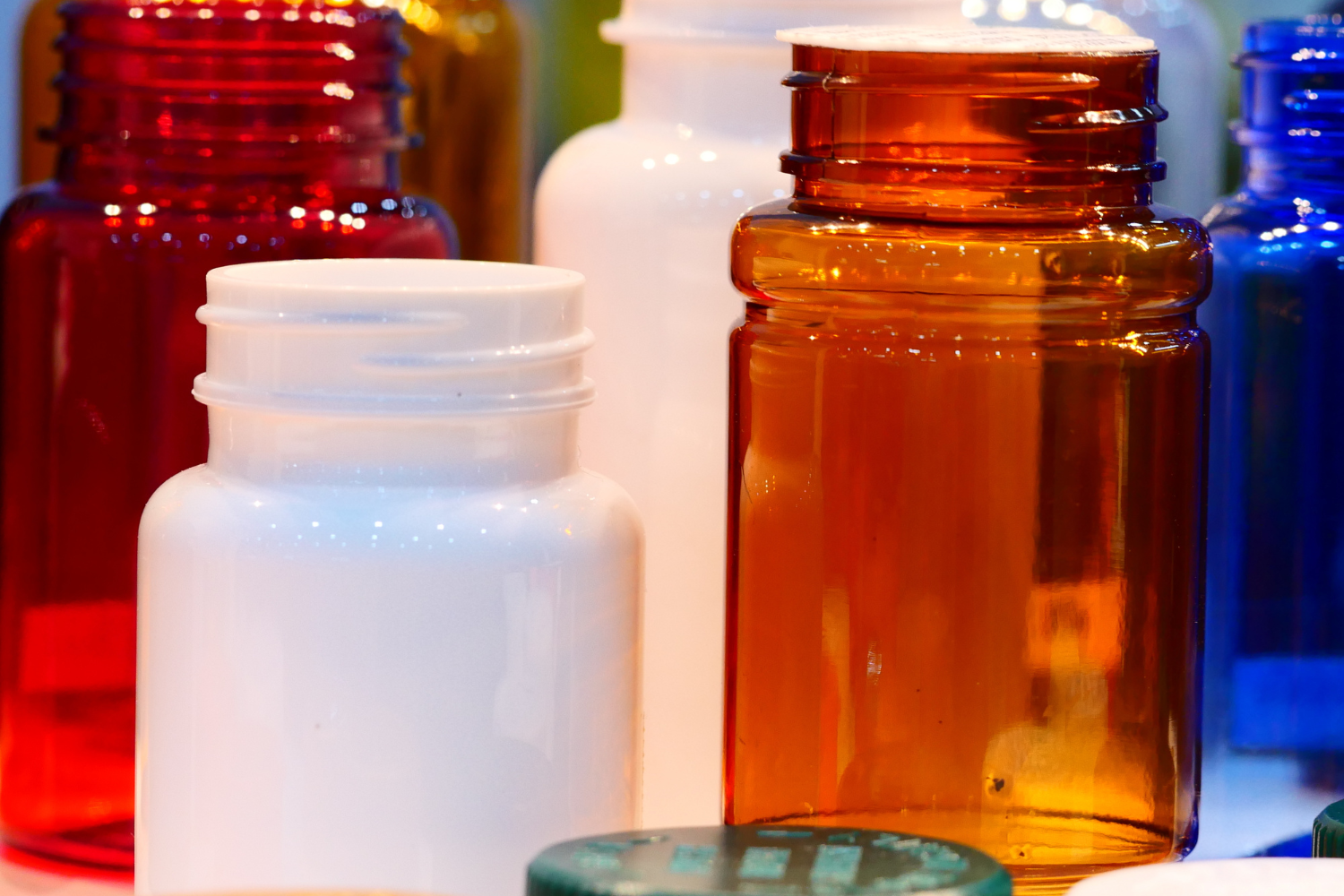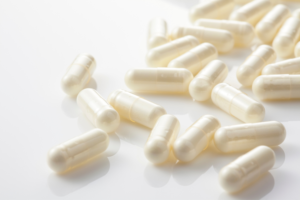Glass vitamin bottles are durable, high-quality containers commonly used for packaging supplements, vitamins, and capsules. These glass pill bottles are known for protecting contents from outside contaminants and harmful chemicals, ensuring the integrity of the supplements. Compared to plastic bottles, glass provides superior protection, making it a preferred choice for businesses focused on product quality and sustainability.
Glass bottles also offer easy filling, preserving supplement potency and enhancing brand image. The following sections will explore the main uses, benefits, and best practices for using glass vitamin supplement bottles for all your packaging needs.
Table of Contents
ToggleWhy Choose Glass Bottles for Your Vitamin Supplements?
Choosing glass bottles for your vitamin supplements offers multiple advantages in terms of product protection and branding. Glass vitamin containers are ideal for maintaining supplement quality and providing a premium look that appeals to health-conscious consumers.
Superior Product Protection
Glass is non-reactive, meaning it doesn’t interact with the vitamins, supplements, or liquids inside. This helps preserve the potency and effectiveness of the supplements over time, unlike some plastic bottles, which may leach chemicals into the contents.
While amber glass does provide UV protection, not all tinted glass offers the same level of protection. The effectiveness depends on the glass tint. Amber is the most effective, but green or clear glass does not offer the same degree of UV shielding. This shields sensitive vitamins like Vitamin D, Vitamin C, and Omega-3 oils from harmful UV rays, helping maintain the potency of your supplements and ensuring they stay effective for a more extended period.
Premium Look and Feel
Glass vitamin containers give your products a premium appearance that appeals to customers looking for high-end, trustworthy supplements. The clear or tinted glass jars provide visibility and signal that your brand prioritizes quality and product integrity.
Using glass bottles can set your brand apart from competitors, especially in a crowded supplement market. Glass pill bottles signal higher quality and attention to detail, helping your brand stand out and attract consumers who value sustainable, premium packaging solutions.
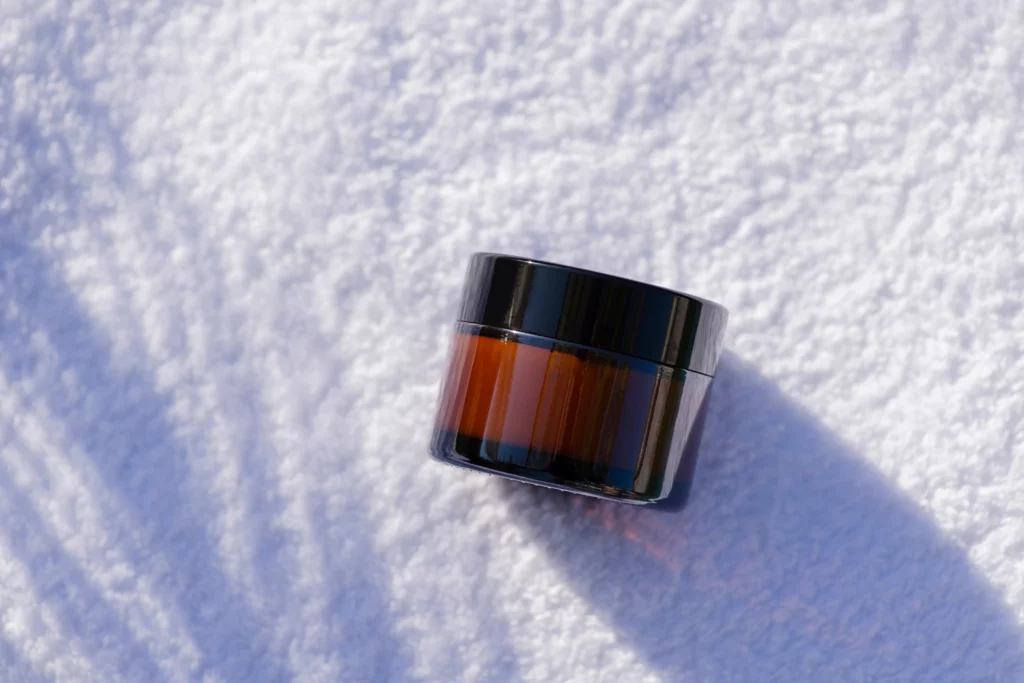
The Benefits of Using Glass Vitamin Bottles
Glass vitamin bottles offer several advantages for both the environment and product quality. From sustainability to better protection for supplements, glass bottles ensure your vitamins are safe, long-lasting, and appealing to eco-conscious consumers.
Environmentally Friendly and Sustainable
Glass bottles are fully recyclable and can be reused, reducing the environmental impact of packaging when properly recycled. However, the actual recycling rates vary, and due to the energy-intensive production and transportation of glass, its overall environmental footprint depends on factors such as local recycling infrastructure and transportation distances. When recycled properly, glass bottles reduce environmental impact, offering a more sustainable packaging option than plastic, which contributes to waste.
Eco-Conscious Branding
By using glass pill bottles, you align your brand with eco-conscious consumers. Offering sustainable packaging options, such as glass, appeals to customers committed to reducing waste and protecting the environment, helping boost your brand’s image.
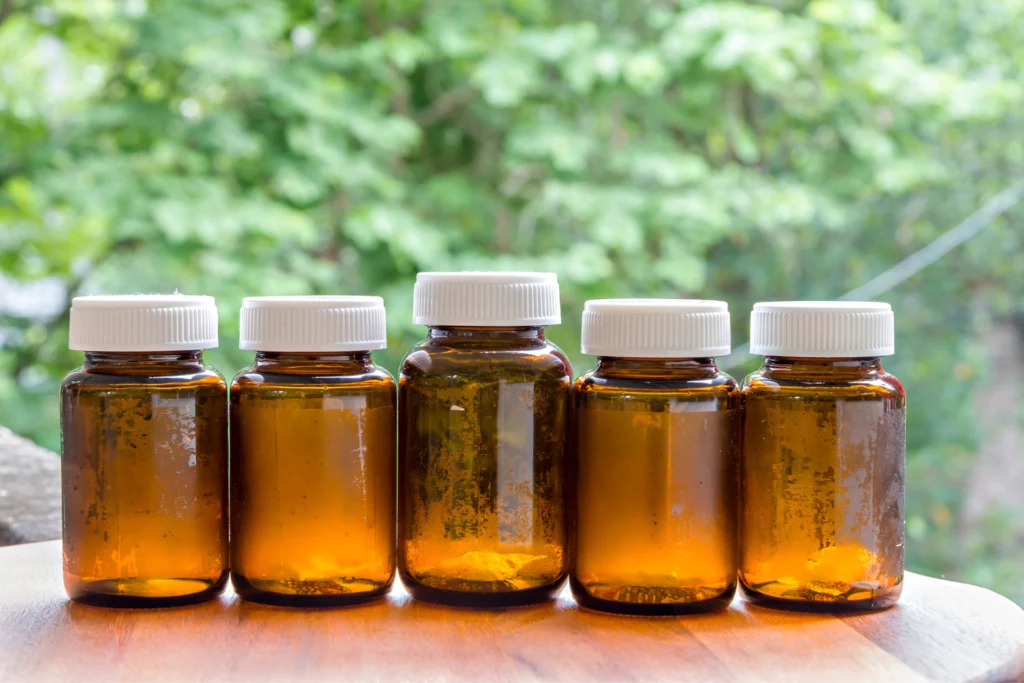
Durability and Longevity
Unlike plastic bottles, glass is highly resistant to contamination, which can leach harmful chemicals into supplements. This makes glass vitamin containers safe for storing vitamins, protecting them from outside contaminants and ensuring product purity. However, it’s worth noting that glass isn’t resistant to physical breakage. Therefore, it’s best to handle glass containers with care, especially during transportation and storage. To minimize the risk of breakage, it’s advisable to use protective packaging, such as bubble wrap or cushioned boxes.
Long Shelf Life
Glass bottles are perfect for long-term storage of vitamins and supplements. Their non-porous nature helps maintain the product’s quality over time, providing a longer shelf life than many plastic alternatives.
Heat and Moisture Resistance
Glass bottles offer superior protection against moisture and temperature changes compared to plastic. This makes them ideal for safeguarding vitamins and other supplements from heat and humidity, ensuring their potency and effectiveness remain intact over time.
Common Uses for Glass Vitamin Bottles
Glass vitamin containers are versatile and commonly used in the supplement industry due to their ability to protect and preserve their contents. They are especially useful for storing liquid vitamins and premium supplements, where quality and shelf life are essential.
Ideal for Liquid Supplements
Glass bottles are commonly used for liquid vitamins like Vitamin D, herbal tinctures, and omega-3 oils. Their non-reactive nature prevents chemical reactions, helping to maintain the freshness and potency of these liquids, which can be sensitive to air and other outside contaminants.
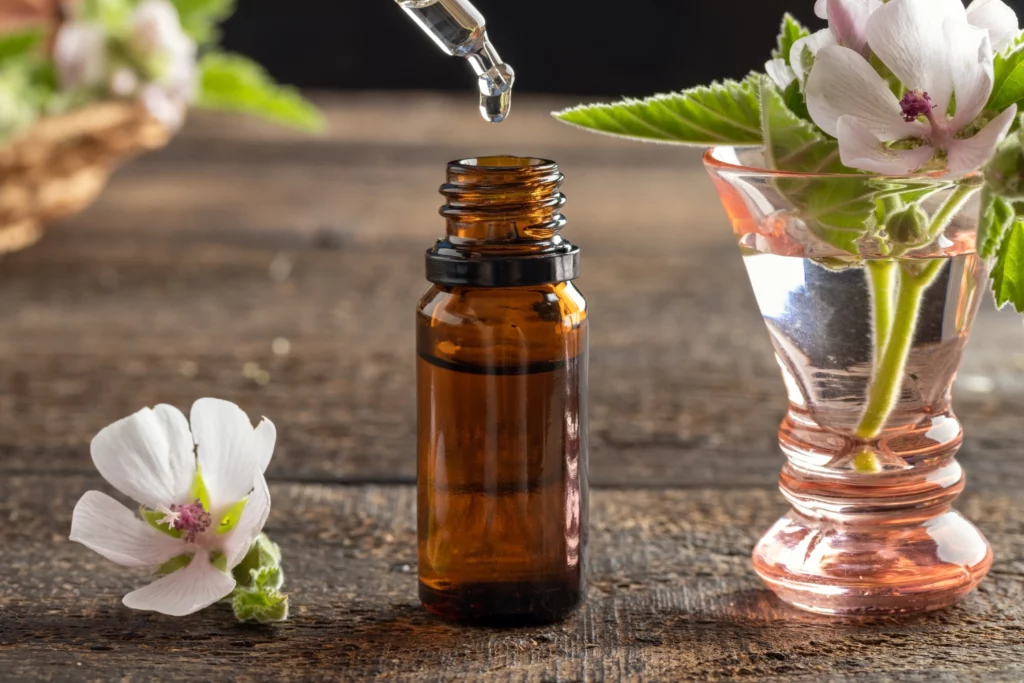
Popular for Premium Capsule and Powder Supplements
Glass bottles are the preferred choice for premium tablets, powders, and multivitamins. Brands that focus on quality and trustworthiness often choose glass for their packaging to enhance the product’s overall image and reflect its high-end positioning.
Protecting Capsules from Light and Air
Glass bottles, especially dark-tinted ones like amber or green, protect capsules from light, moisture, and air exposure. This helps preserve the supplements’ potency, ensuring that they remain effective over time, even when stored for longer periods.
Considerations When Choosing Glass Vitamin Bottles
When selecting glass vitamin bottles for your products, it’s essential to consider factors like cost, transport concerns, and customization options. These factors can impact both your budget and the overall customer experience.
Costs and Budget Considerations
Glass bottles are generally more expensive to produce and ship than plastic supplement bottles. The weight and fragility of glass can increase expenses, so it’s essential to account for these additional expenses when budgeting for your packaging needs. On the other hand, plastic vitamin bottles can decrease shipping costs, which is naturally a cheaper option.
Weighing the ROI of Premium Packaging
While glass bottles may have higher costs, they can lead to a higher perceived value for your supplements. Premium packaging often attracts customers who are willing to pay more, potentially increasing sales and making the investment in glass worth the cost.
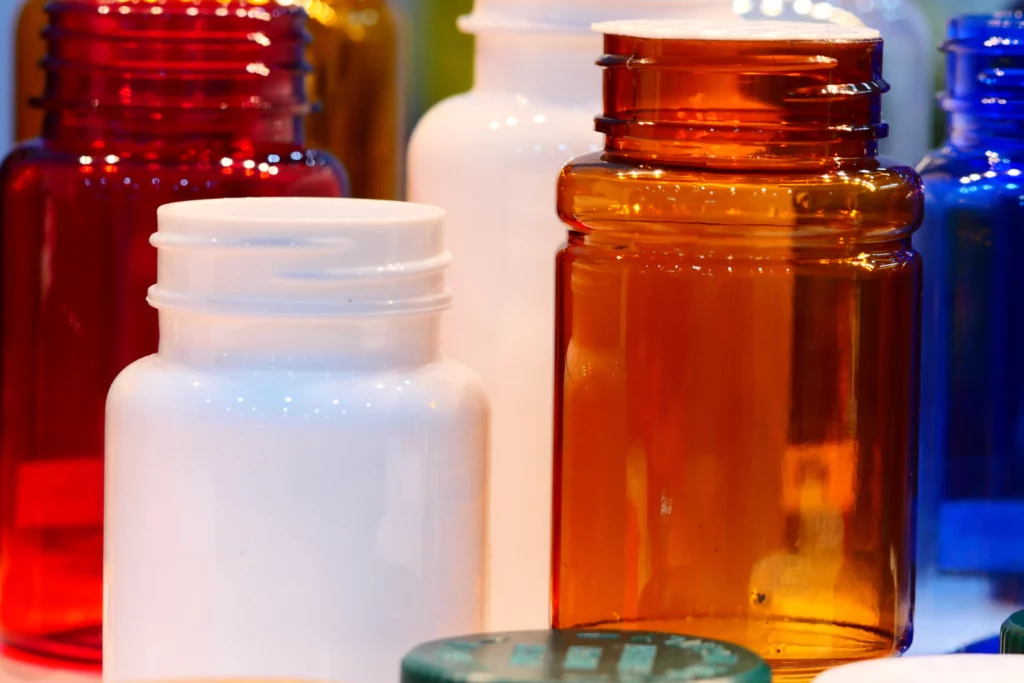
Fragility and Shipping Concerns
Since glass bottles are more fragile than plastic, businesses must take extra care when transport. Protective packaging materials like foam inserts or bubble wrap can prevent breakage and ensure your supplements arrive safely.
Packaging for Glass Bottles
To protect glass bottles during transport, consider using these tips:
- Wrap each bottle individually in bubble wrap.
- Use foam inserts to keep bottles secure in the box.
- Simply add air pillows or packing peanuts to fill empty spaces.
- Choose sturdy, corrugated boxes to reduce impact.
- Label packages as “Fragile” to alert carriers of the delicate contents.
Customization Options
Glass vitamin bottles offer a smooth surface ideal for high-quality, professional labeling. This allows you to create eye-catching designs that reflect your brand’s identity and enhance the overall product presentation.
Custom Shapes and Sizes
Glass bottles come in various custom shapes, sizes, and colors, including amber, green, and clear glass. This flexibility allows you to choose the perfect container to meet your brand’s needs and appeal to your target audience, whether you’re packaging tablets, liquids, or powders.
Sustainable Packaging Solutions for Glass Vitamin Bottles
Glass vitamin bottles are an eco-friendly packaging choice, and there are even more ways to make them sustainable by using recycled glass and offering refillable bottle programs.
Recycled Glass Options
Using recycled glass bottles for your vitamins is an excellent way to promote sustainability. Recycled glass reduces the need for new raw materials, minimizes waste, and lowers the environmental impact of your packaging. It offers the same high quality and durability as new glass while contributing to a circular economy.
Refillable Glass Bottle Programs
A refillable glass bottle program can promote brand loyalty and help reduce waste. Customers can return or refill empty bottles, cutting down on single-use packaging and aligning your brand with eco-conscious values. This lowers environmental impact and encourages repeat business and customer engagement.
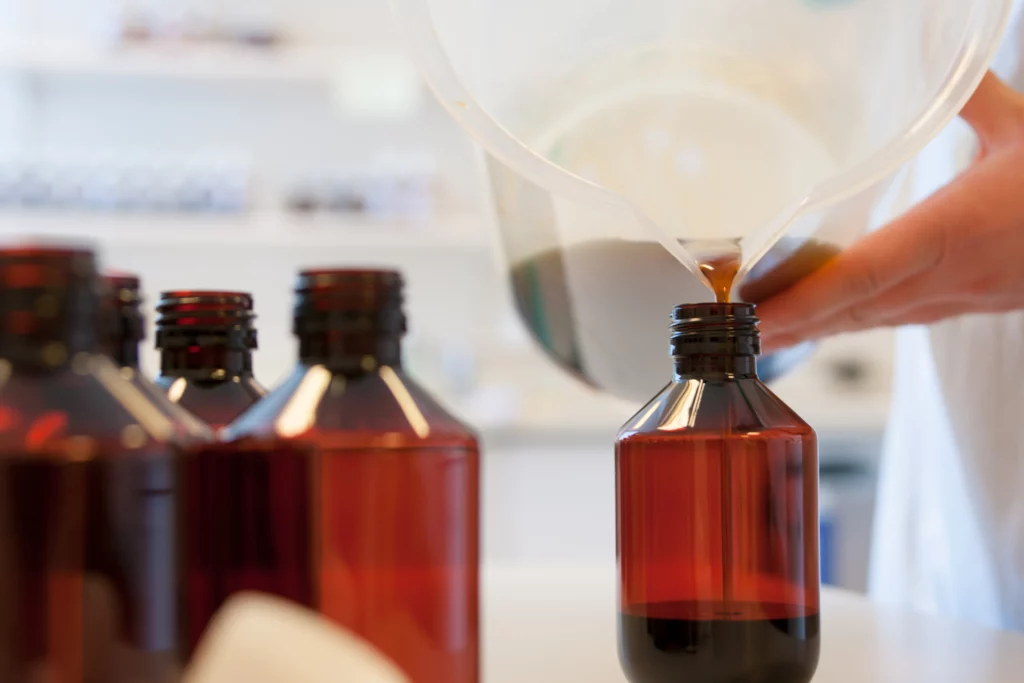
How to Choose the Right Glass Bottle Supplier for Your Vitamins
Choosing the right supplier for your glass vitamin bottles is essential for ensuring product quality, compliance, and brand consistency. Here are key factors to consider when selecting a supplier.
Evaluating Supplier Certifications
It’s crucial to select suppliers who meet GMP (Good Manufacturing Practice) standards and FDA regulations for dietary supplement packaging. These certifications ensure that the glass bottles are produced in a clean, controlled environment, protecting your supplements from contaminants.
Customization and MOQ (Minimum Order Quantity)
When sourcing glass bottles, consider suppliers who offer customization options such as unique shapes, sizes, or labeling. These features can help your brand stand out. It’s also important to find suppliers who meet your minimum order quantity (MOQ) needs to avoid over-ordering or wasting resources.
Domestic vs. International Suppliers
When deciding between a domestic or international supplier for your glass bottles, consider the following factors:
- Cost: International suppliers may offer lower prices, but shipping costs could be higher.
- Shipping Time: Domestic suppliers generally provide faster shipping times, which can reduce delays in product availability.
- Quality: International suppliers may have lower costs, but you’ll need to ensure their quality matches the standards of your domestic options.
Case Studies: Successful Supplement Brands Using Glass Bottles
Glass vitamin pill bottles are becoming increasingly popular among supplement brands due to their sustainability and ability to preserve product quality. Let’s look at two successful brands using glass for their packaging.
Seed: Luxury Vitamin Brand
Seed, a high-end probiotic supplement brand, uses glass bottles to emphasize purity, quality, and sustainability. Their initial shipment includes a glass jar, which customers refill with compostable pouches, aligning with eco-conscious consumer values. Seed packaging their probiotics in glass ensures product protection and a luxurious feel, attracting environmentally aware customers looking for premium supplements.
Orlo Nutrition: Organic Supplement Brand
Orlo Nutrition, known for its organic omega-3 supplements, uses amber glass bottles to preserve the freshness of its all-natural ingredients. Amber glass effectively blocks light, protecting sensitive ingredients like omega-3 oils from degradation. The brand’s focus on sustainability also extends to refillable glass containers, appealing to eco-conscious consumers who prioritize quality and environmental impact.
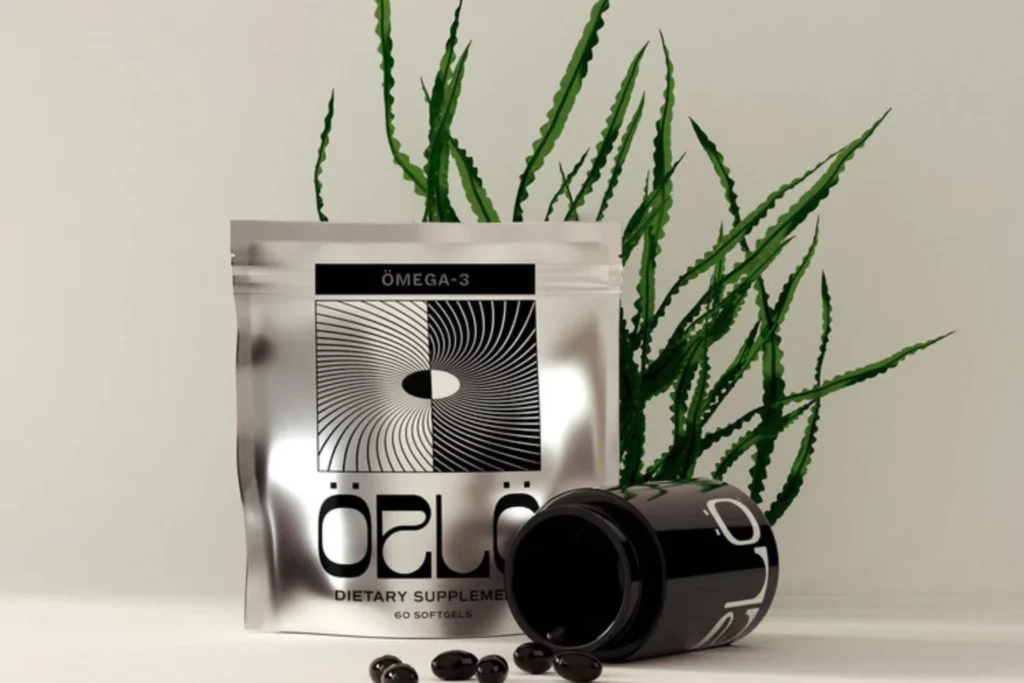
Glass vs Plastic Bottles for Vitamin Supplements: A Final Comparison
When deciding between glass and plastic supplement pill bottles for your vitamin supplements, it is important to weigh the pros and cons of each material based on your brand’s needs.
Weighing the Pros and Cons
Glass vitamin pill bottles offer better product protection, especially for sensitive ingredients, and appeal to consumers who value sustainability. However, they are heavier and more expensive to produce and ship than plastic, which is lightweight and cost-effective but may compromise product integrity over time.
Recommendations Based on Your Brand and Product Needs
If your brand focuses on premium, eco-friendly products, glass bottles may be the best option. They not only protect the quality of supplements but also enhance your brand’s image as a high-end, sustainable choice. On the other hand, if cost and scalability are top priorities, plastic supplement bottles offer more flexibility. They are cheaper to produce and ship, making them suitable for brands aiming for wider market distribution at a lower price point.
Why Glass Vitamin Bottles are the Right Choice for Supplements
Using glass vitamin bottles provides significant advantages for supplement brands, including superior product protection, enhanced sustainability, and a premium look that appeals to eco-conscious consumers. Glass bottles preserve the potency of vitamins, reduce the risk of contamination, and signal a high-quality product. When choosing between glass and plastic supplement bottles, evaluating your budget, brand positioning, and product requirements is essential. Start using glass bottles for vitamin supplements today to boost product quality and elevate your brand’s perception.
Frequently Asked Questions
Why are glass bottles better for storing vitamins than plastic bottles?
Glass bottles offer better protection against chemical leaching and preserve the potency of vitamins by blocking light and moisture.
Are glass vitamin bottles recyclable?
Yes, glass vitamin pill bottles are 100% recyclable and can be reused, making them an eco-friendly packaging option.
How can I prevent glass bottles from breaking during shipping?
To prevent breakage during transport, use protective materials like bubble wrap, foam inserts, and sturdy boxes labeled as “fragile.”
Are glass bottles more expensive to ship than plastic supplement bottles?
Yes, glass bottles are heavier and more fragile, leading to higher transport costs than lightweight plastic supplement bottles.
What types of supplements are best stored in glass bottles?
Glass bottles are ideal for storing liquid vitamins, premium tablets, and powders that require light, air, and moisture protection.
References
- U.S. Department of Agriculture (USDA). (2012). Organic 101: What the USDA Organic Label Means. https://www.usda.gov/media/blog/2012/03/22/organic-101-what-usda-organic-label-means
- U.S. Department of Energy (DOE). (n.d). Facts About Glass Recycling. https://www.gpi.org/facts-about-glass-recycling
- U.S. Department of Health and Human Services (HHS). (2024). Current Good Manufacturing Practices (CGMPs) for Food and Dietary Supplements. https://www.fda.gov/food/guidance-regulation-food-and-dietary-supplements/current-good-manufacturing-practices-cgmps-food-and-dietary-supplements
- U.S. Environmental Protection Agency (EPA). (2023). Recycling Basics and Benefits. https://www.epa.gov/recycle/recycling-basics-and-benefits
- U.S. Food and Drug Administration (FDA). (2016). Dietary Supplement Labeling Guide: Chapter II. Identity Statement. https://www.fda.gov/food/dietary-supplements-guidance-documents-regulatory-information/dietary-supplement-labeling-guide-chapter-ii-identity-statement
- U.S. Food and Drug Administration (FDA). (2017). Guidance for Industry: Dietary Supplement Labeling Guide. https://www.fda.gov/regulatory-information/search-fda-guidance-documents/guidance-industry-dietary-supplement-labeling-guide

